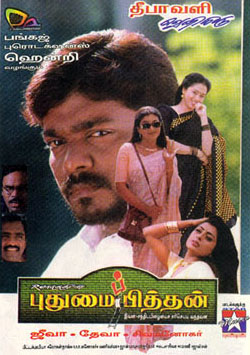Top Qs
Timeline
Chat
Perspective
Pudhumai Pithan (1998 film)
1998 Indian film From Wikipedia, the free encyclopedia
Remove ads
Pudhumai Pithan is a 1998 Indian Tamil-language political satire film directed by S. K. Jeeva. The film stars Parthiban, Roja, Devayani and Priya Raman, while Anandaraj and Ranjith play key roles. It was released on 20 October 1998, during Diwali.[1] The film was later dubbed into Telugu as Oka Votu.[2]
Remove ads
Plot
This article's plot summary needs to be improved. (July 2023) |
Jeeva, a social activist, ends up in a police lock-up. Mahesh, a police officer, is surprised to see his best friend Jeeva in this condition and brings him to his home. Mahesh lives happily with his wife Aarthi and his daughter.
Aarthi and Jeeva were in love in the past. Ramadass, Aarthi's father, hated Jeeva and his activism. As an honest police officer, Ramadass protected a corrupted politician and was beaten by Jeeva's supporters. Later, Aarthi and Jeeva split up. Jeeva clashes with the same politician, his whole family dies due to his orders and Jeeva was sent to a mental hospital. Gayathri, a nurse, helps him to escape from the hospital and then she accommodates him in her house from where he later fled.
Now, Jeeva changes his name and is determined to clean up the society. He also falls in love with the prostitute Shenbagam. Jeeva as Bharath becomes popular among the poor and subsequently becomes a minister.
Remove ads
Cast
- Parthiban as Jeeva / Bharath
- Roja as Shenbagam
- Devayani as Aarthi
- Priya Raman as Gayathri
- Anandaraj
- Ranjith as Mahesh
- Jai Ganesh as Ramadass
- Vadivelu as 'Super' Suruli
- S. S. Chandran
- Charle
- Delhi Ganesh as Viswanath
- Vasu Vikram as Karimuthu
- Laxmi Rattan
- Sabitha Anand as Bhavani, Jeeva's sister
- Dubbing Janaki as Jeeva's mother
- Bala Singh
- Thiruppur Ramasamy as Ramasamy
- Idichapuli Selvaraj
- Joker Thulasi
- Shilpa as Anandraj's daughter
- Mahanadi Shankar
- Crane Manohar as 'Super' Suruli's sidekick
- Kovai Senthil
- MRK
- Bayilvan Ranganathan
- Muthukaalai
- Baby Hemalatha
- Shakeela as Vanaja
- John Babu in a cameo appearance
Remove ads
Production
Gautami was originally chosen as one of the actresses but due to her marriage she was replaced by Priya Raman.[3]
Soundtrack
The soundtrack was composed by Deva.[4][5]
Remove ads
Reception
Summarize
Perspective
A critic from Dinakaran noted "The film has tried to establish how a politician could be a good leader too! But it's rather surprising to note how so experienced an artiste like Parthiban forgot the fact that such a subject when dealt with in cinema medium has to be told in an uniformly interesting manner from the beginning till the end".[6] Kala Krishnan Ramesh from Deccan Herald wrote, "the film is often downright silly, when not crass, but it has a kind of senseless appeal. To be honest, it hasn’t gone as far overboard as it could have with its masala mix. It, commendably, has no scenes of communal violence, no religious chauvinism, and its single rape scene is cut short by the mother shooting dead her about-to-be-raped daughter".[7]
K. N. Vijiyan of New Straits Times called it "one of the best movies of the year. See it if you appreciate meaningful movies".[8] Ji of Kalki wrote that despite the three heroines, the film has a documentary feel to it, and congratulated director Jeeva himself for taking on an otherwise responsible venture.[9] D. S. Ramanujam of The Hindu wrote, "No doubt, debutant director, Jeeva, has adopted cinematic solutions to a few issues but overall, he generates an atmosphere suggesting that everything is not lost, if the electorate uses its vote weapon properly to choose the right person".[10]
Remove ads
References
External links
Wikiwand - on
Seamless Wikipedia browsing. On steroids.
Remove ads

